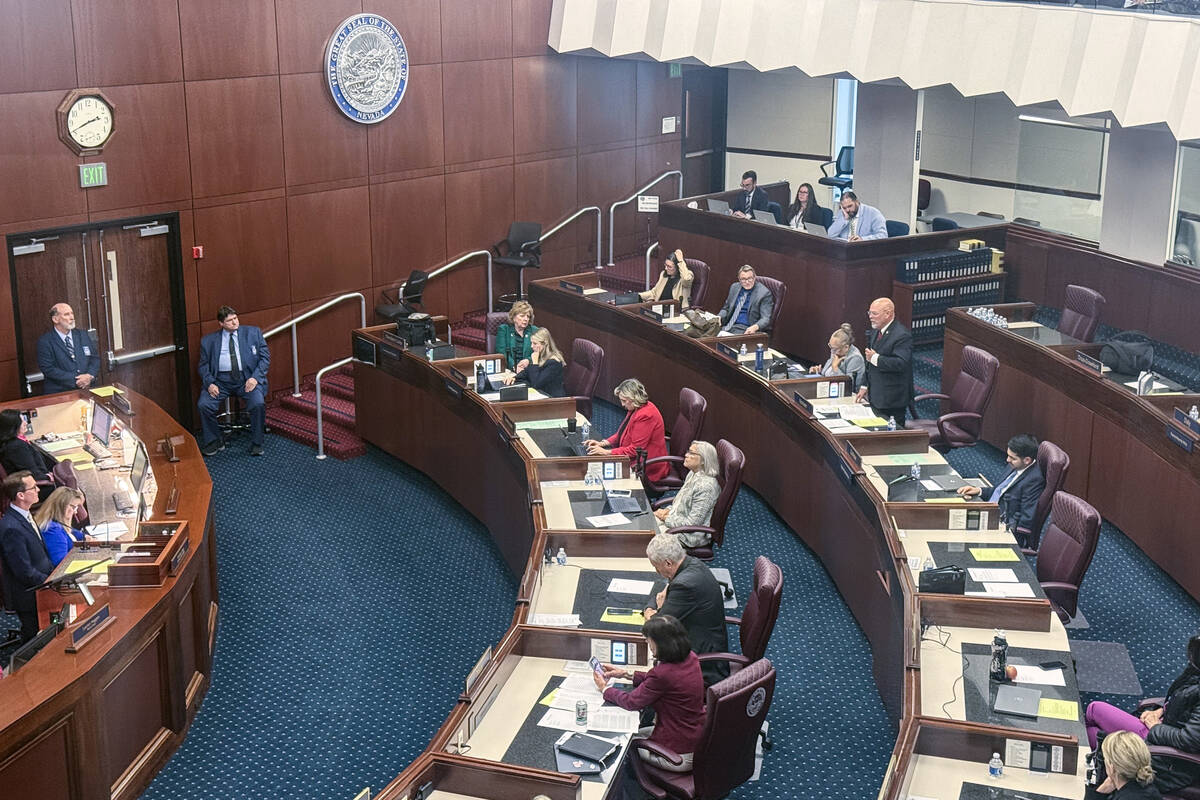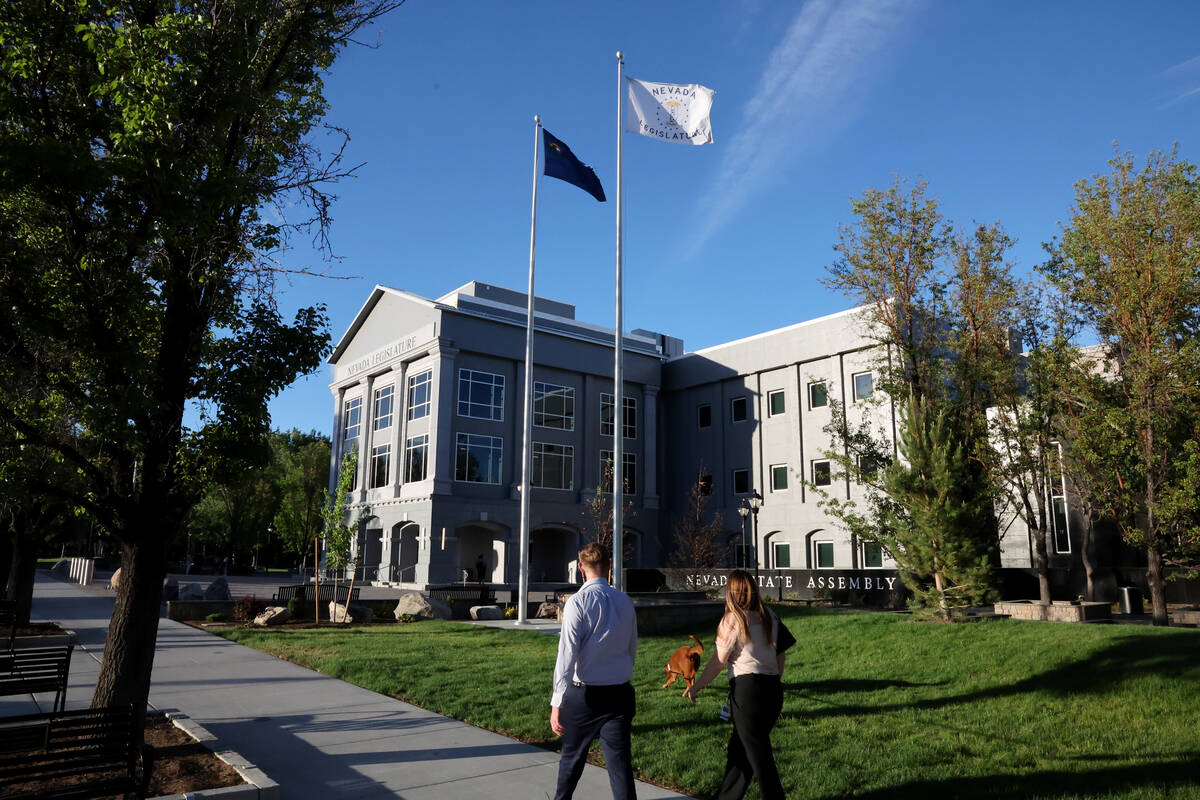Special session Day 3: State version of SNAP program heads to governor’s desk
CARSON CITY — A bill that would create the framework for a state-supported public assistance program is on its way to the governor’s desk after a unanimous vote in the Nevada Assembly during the third day of the special legislative session Saturday.
Senate Bill 3 would establish the Silver State General Assistance Program, a program within the Nevada Division of Social Services that would provide temporary financial or in-kind assistance to eligible people or households, much like the federal government’s Supplemental Nutrition Assistance Program, or SNAP, does.
The proposal followed SNAP’s funding lapse during the federal government shutdown. Senate Democrats said they wanted to create a similar system run by the state in case of future funding lapses. The bill does not include appropriations because SNAP funds were released at the end of the shutdown.
Gov. Joe Lombardo must sign the bill before it can become law. It passed out of the state Senate unanimously on Thursday.
Two major pieces of legislation were not voted on in the Assembly — their house of origin — before it adjourned Saturday: the proposal to significantly expand the state’s film tax credit program and Lombardo’s bill to reform more than a dozen areas of the state’s criminal justice code.
Assembly leadership sought to deem all legislation considered Saturday as emergency measures, allowing a floor vote that day. But the motion did not receive the required two-thirds majority vote. It came up — and failed — again in the Assembly’s afternoon floor session, effectively forcing the two bills to be pushed to Sunday’s agenda.
Lombardo announced the special session on Wednesday with less than 24 hours notice. The agenda includes over a dozen legislative proposals and budget appropriations.
First responders’ comp bill passed through Senate,
On Saturday, lawmakers added another bill that would make it easier for first responders to receive compensation for lung disease claims. The bill passed through a Senate committee, the full Senate and an Assembly committee on Saturday afternoon, hours after it was first introduced.
Payments to government employees for lung and heart disease claims have been litigated in Nevada for years. Those who have called for stricter regulation on government employees’ heart and lung disease benefits have said current carve-outs already result in millions of dollars in costs to taxpayers, the Las Vegas Review-Journal reported earlier this year.
Under current law, a first responder can receive medical benefits for lung disease if the disease was caused by exposure to heat, smoke or gas.
On Thursday, the Nevada Supreme Court released an opinion affirming that interpretation of the law, court records show. A similar ruling came out of the Nevada Court of Appeals on Wednesday that also affirmed the interpretation of the law.
Both cases involved workers who were seeking workers compensation for lung disease due to COVID-19.
Proponents of Senate Bill 7 have said that for decades, workers compensation has been given to first responders for lung diseases under the presumption that their medical conditions were work related. The legislation would establish the presumption regardless of whether the disease was caused by exposure to heat, smoke or gas.
Senator Melanie Scheible, D-Las Vegas, told lawmakers that the bill was meant to address the recent court rulings and establish the Legislature’s intent in the original law. Other senators questioned why the bill was added onto the special session because the governor’s proclamation does not directly reference the issue beyond an instruction for lawmakers to address “wages and hours.”
Senator Robin Titus, R-Wellington, spoke against the substance of the bill, saying that the Legislature has not attempted to create benefits for lung disease outside of occupational exposure to heat, smoke or gas.
Five senators opposed the bill’s passage from the Senate: Titus, John Ellison, R-Eureka; Ira Hansen, R-Sparks; Lisa Krasner, R-Reno; and Lori Rogich, R-Las Vegas.
During the Assembly Public Safety and Security Committee session, former Nevada lawmaker Danny Thompson testified that when he first introduced legislation on lung disease worker’s compensation in 1989, it was his intent for the law to cover as many first responders as possible.
“I would urge you to pass this bill to right this wrong decision,” Thompson said, referring to the recent court rulings.
Assemblymember Alexis Hansen, R-Sparks, was the only member of the committee who voted against passing the bill on to the full Assembly. She said she was not comfortable voting to pass the bill on short notice due to its “complications.”
Public officer security, cybersecurity bills advance
Assembly Bill 1, which proposes beefing up the state’s cybersecurity infrastructure, passed the Assembly unanimously. The bill would create a centralized Security Operations Center in the executive branch and allow that center to apply for and use federal grants, among other provisions. It would dedicate almost $9.9 million for the two-year budget cycle to improved cybersecurity efforts and almost $3.4 million over the budget cycle in loans from the Governor’s Finance Office to the Governor’s Technology Office to cover revenue shortfalls.
“For decades, we have attempted band-aid after band-aid, playing a proverbial game of whack-a-mole for cybersecurity,” Timothy Galluzi, the state’s chief information officer, told lawmakers in a Thursday hearing. “The world around us is evolving too fast to maintain an environment of haves and have-nots. The cybercriminals can find the vulnerability far too quickly for that strategy to work.”
The bill comes after the state faced a ransomware attack discovered in August that crippled state services for weeks during the recovery process.
The Senate Public Safety and Security Committee also passed the measure through on Saturday evening.
Assembly Bill 3, which would allow lawmakers to request to conceal their personal information in secretary of state, county and city records, passed out of the Assembly on Saturday. It was later passed through the Senate Health and Wellness Committee on Saturday evening, but has yet to be heard by the full Senate.
Two assemblymembersopposed the bill: PK O’Neill, R-Carson City, and Brian Hibbetts, R-Las Vegas.
Hibbetts said he shared concerns with journalism and open government groups that the bill would limit the public’s access to information about elected officials. If officials can conceal their home addresses more easily, it would be harder to confirm a public officer is living in the district they’re elected to represent, he said.
“As an elected official it is our duty to be available and responsible to the public,” Hibbetts said. “And if we’re hiding everything about us, how can we do that?”
The Nevada Press Association and Nevada Open Government Coalition have authored a joint statement opposing the bill and raising transparency concerns over limiting access to public information.
Howard Watts, D-Las Vegas, presented the bill to the Assembly Public Safety and Security committee on Thursday. He’s said the bill is in response to Nevada lawmakers who have faced safety threats plus the rise in political violence across the country, such as the killings of two Minnesota lawmakers earlier this year.
Big bills await consideration
Other legislation that was moved on Saturday included Assembly Bill 6, which increases penalties for violations in school traffic zones and gives local governments more control over the zones. After hearing testimony on Friday, the Assembly Committee on Public Safety and Security unanimously moved the bill to the full Assembly on Saturday evening.
The proposal to develop a film studio campus in Summerlin with tax incentives awaits a vote from the full Assembly. Assembly Bill 5 proposes offering $95 million in annual transferable tax credits tied to the development of Summerlin Studios. The credits would be available for 15 years beginning in 2029 and would first require developer Howard Hughes and partnering Hollywood production companies to spend $400 million in capital investment before then.
Several amendments presented during the meeting changed diverse hiring requirements and changed the location and partnership for a training and educational center. Another amendment would dedicate a portion of the room tax collected from the hotel expected to be built on the campus to an account for paying certain qualified medical expenses for retired state employees covered by the Public Employees’ Benefits Program.
Lombardo’s sweeping crime bill passed out of the Assembly Public Safety and Security committee on Friday but did not get put up for a vote on Saturday.
Assembly Bill 4 seeks to alter nearly a dozen different areas of Nevada’s criminal justice laws and could usher in the return of a controversial court program in Las Vegas that coincided with judges banning criminal defendants from the Strip. Opponents have criticized the program for targeting homeless people in the area.
Both bills must pass a vote from assemblymembers before they can advance to the state Senate.
The Senate was still in session as of the Review-Journal’s print deadline Saturday evening.
Contact McKenna Ross at mross@reviewjournal.com. Follow @mckenna_ross_ on X. Contact Katelyn Newberg at knewberg@reviewjournal.com or 702-383-0240.





















